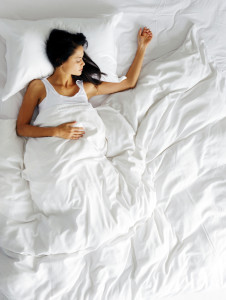 Western Medicine has increasingly recognized and investigated sleep disorders over the last 30 years. Western medicine divides sleep disorders into those with abnormal movements, abnormal dreaming or sleep-walking/talking versus those traditionally considered “insomnia:” trouble with quality, quantity, continuity, or timing/onset of sleep. Increased recognition and treatment of obstructive sleep apnea (breathing cessation during sleep) has resulted in improved quality of life and decreased rates of resultant cardiovascular complications. Some sleep disorders occur as a result of other underlying medical or neurological disorders, such as dementia. Determining to what extent emotions like anxiety or depression play a role can be difficult.
Western Medicine has increasingly recognized and investigated sleep disorders over the last 30 years. Western medicine divides sleep disorders into those with abnormal movements, abnormal dreaming or sleep-walking/talking versus those traditionally considered “insomnia:” trouble with quality, quantity, continuity, or timing/onset of sleep. Increased recognition and treatment of obstructive sleep apnea (breathing cessation during sleep) has resulted in improved quality of life and decreased rates of resultant cardiovascular complications. Some sleep disorders occur as a result of other underlying medical or neurological disorders, such as dementia. Determining to what extent emotions like anxiety or depression play a role can be difficult.
Most are familiar with good “sleep hygiene” recommendations: winding down before bed, going to bed at the same time nightly, refraining from stimulation (TV, computer work, reading, listening to news) before bed, and avoiding alcohol. Medications have been very well publicized: the non-benzodiazepine class like Ambien/Lunesta, the sedative class, antihistamines, and one medication from the anti-depression class are currently in the formulary for treating sleep disorders.[1]
Traditional Chinese Medicine (TCM) has strategies for addressing most types of sleep disorder. The “Heart” and “Gallbladder System” (not the literal heart and gallbladder organs defined in Western anatomic classification) “deficiencies” may produce early morning waking. The disorders are broken down into those with difficulty falling asleep (“Heart Blood deficiency”/”Shen” disturbance), staying asleep (“Yin” and “Blood deficiencies”), light-and-non- refreshing sleep (“Yin deficiency”), dream disturbed sleep (“Shen/ Fire and Wood System” disturbances), sleep walking (“Hun/ Wood System” disorder) and night terrors (“Shen and Hun” disorders). For reversible obstructive sleep apnea, “Phlegm” may be the culprit.
As a result of specific pattern recognition, TCM offers effective and long lasting interventions to improve sleep. Body and ear acupuncture can very much rebalance the system—almost everyone reports a wonderful night’s sleep after acupuncture. To address the deeper causes of these imbalances, Chinese Herbal Medicine works to prevent recurrences of old patterns. Ayurveda, the traditional medicine of India, provides proscriptions for daily habits that greatly promote sleep, and help avoid over-stimulation of the central nervous system on a daily basis.[2 3 4]
Neurological Conditions Testimonials
Learn more about Sleep Disorders
X
These brief overviews of conditions represent distillations of basic and current medical reviews from the following sources:
[1] Conventional Medical Sources
“Harrison’s Principles of Internal Medicine: Volumes 1 and 2, 18th Edition”. Dan Longo Anthony Fauci, Dennis Kasper, Stephen Hauser, J. Jameson, Joseph Loscalzo. McGraw-Hill Professional; (July, 2011)
Medscape eMedicine Physician’s online resource. Various review articles:
Complex Regional Pain Syndromes Treatment & Management.
Anthony H Wheeler MD. Medscape Reference Chief Editor: Stephen A Beman, MD PhD MBA.
Essential Tremor
Deborah A Burke, MD Clinician, Sub-Investigator, Movement Disorder/Parkinson’s Disease Center, University of South Florida College of Medicine; Investigator, Physician, Roskamp Institute Memory Clinic
Bell Palsy
Danette C Taylor, DO, MS Clinical Assistant Professor, Department of Neurology and Ophthalmology, Michigan State University College of Osteopathic Medicine; Senior Staff Neurologist, Henry Ford Health Systems
Meniere Disease (Idiopathic Endolymphatic Hydrops)
John C Li, MD Private Practice in Otology and Neurology; Medical Director, Balance Center
Restless Legs Syndrome
Ali M Bozorg, MD Assistant Professor, Comprehensive Epilepsy Program, Departments of Neurology and Neurosurgery, University of South Florida College of Medicine
Postherpetic Neuralgia
W Alvin McElveen, MD Director, Stroke Unit, Lakewood Ranch Medical Center; Neurologist, Manatee Memorial Hospital
Sleep disorders
Roy H Lubit, MD, PhD Assistant Clinical Professor, Mount Sinai School of Medicine; Clinical Faculty, Department of Child Psychiatry, New York University School of Medicine; Private Practice
Tinnitus
Aaron G Benson, MD Director, Ohio Hearing and Balance Institute, Maumee, Ohio; Consulting Staff, Toledo Ear, Nose and Throat, Inc
Multiple Sclerosis
Christopher Luzzio, MD Clinical Assistant Professor, Department of Neurology, University of Wisconsin at Madison School of Medicine and Public Health
Parkinson Disease
Robert A Hauser, MD, MBA Professor of Neurology, Molecular Pharmacology and Physiology, Director, USF Parkinson’s Disease and Movement Disorders Center, National Parkinson Foundation Center of Excellence, Byrd Institute, Clinical Chair, Signature Interdisciplinary Program in Neuroscience, University of South Florida College of Medicine
Tourette Syndrome and Tic Disorders
William C Robertson Jr, MD Professor, Departments of Neurology, Pediatrics, and Family Practice, Clinical Title Series, University of Kentucky College of Medicine
Post Concussive Syndrome
Roy H Lubit, MD, PhD Assistant Clinical Professor, Mount Sinai School of Medicine; Clinical Faculty, Department of Child Psychiatry, New York University School of Medicine; Private Practice
Traumatic Brain Injury
Segun T Dawodu, MD, JD, MBA, LLM, FAAPMR, FAANEM Associate Professor of Rehabilitation Medicine and Interventional Pain Medicine, Albany Medical College
Dizziness, Vertigo, Imbalance
Hesham M Samy, MD, PhD Head of Hearing and Balance Unit, Otolaryngology Department, Minia University, Egypt
CNS Causes of Vertigo
Marcelo B Antunes, MD Resident Physician, Department of Otorhinolaryngology-Head and Neck Surgery, University of Pennsylvania Health System
Communication Disorders
Renee S Melfi, MD Consulting Staff, Orthopaedic Associates of Central New York
[2], [3]
- “Acupuncture Energetics: A Clinical Approach for Physicians”. Joseph M. Helms. Medical Acupuncture Publishers; 1st Edition. (1995)
- “Foundations of Chinese Medicine: A Comprehensive Text for Acupuncturists and Herbalists”. Giovanni Maciocia. Churchill Livingstone; 2 Edition (July, 2005).
- “Diagnosis in Chinese Medicine: A Comprehensive Guide”. Giovanni Maciocia. Churchill Livingstone; 1st Edition (January, 2004).
Chinese Scalp Acupuncture”. Jason Ji-shun Hao, Linda Ling-zhi Hao and Honora Lee Wolfe. Blue Poppy Press; 1st Edition. (November, 2011)
